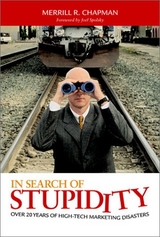Book Review: In Search of Stupidity: Over 20 Years of High-Tech Marketing Disasters

In Search of Stupidity: Over 20 Years of High-Tech Marketing Disasters is a time-travel trip through two decades of technology plagued by stupidity. Both new and old high-tech flops are present, most already forgotten. The dot-com chapter should be read now while it still hurts, but some unknown jewels are here too. Did you know that, for some inexplicable reason, a "sound library" that allowed users to add pissing and similar sounds to any program for only 49.95 USD didn't succeed? The book tells this tale together with those from Apple, Borland, IBM, Motorola, Napster, Netscape and others.
Hardware failures such as Iridium and the IBM Peanut are included, but only the world of commercial proprietary software is covered. If you expect to find such reasons as "not going open source" or "not using free software" listed as the root of a mistake, you'll be deluded. The Linux guys are almost never mentioned. When it happens it is very, very brief, practically off topic. The longest coverage occurs in the glossary:
open source: both a movement and a process of creating software that believes that the underlying source code of products should be freely accessible to users. Many open source programmers believe Bill Gates is Satan. Bill Gates believes many open source programmers are communist.
When Microsoft actually did something stupid, marketing-wise, the author points it out without pity. Overall, however, the company is mentioned as the example to follow, because it so far has been able to make much fewer mistakes than the other companies.
In spite of this, or maybe exactly for this reason, In Search of Stupidity is worth reading. First of all, it is important to understand what the other half of the software world thinks and expects. Secondly, the book is well written and entertaining. Both style and vocabulary are accessible to non-programmers; the writing is clear and simple, but never dumbed down.
Recognizing that many of the described errors happen also in the Free Software community, be they bad project management, coding for needs that don't exist or falling in love with new technologies "just because" may also be useful. Discovering which ones they are obviously is left as exercise for the reader.
In Search of Stupidity is right on target and amusing. If it lack something, it is the acknowledgment that free software changes the rules, making it possible for software profits to shift from purely selling binaries to services. On the other hand, it is written by a veteran of the proprietary software industry for that industry and honestly is presented as such.






